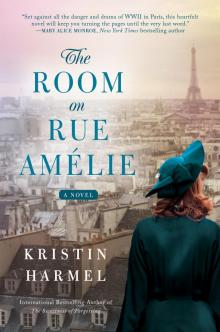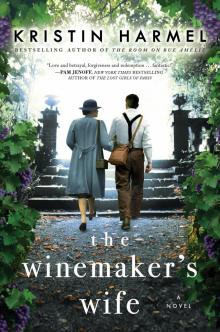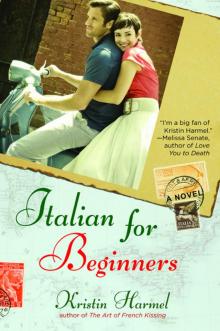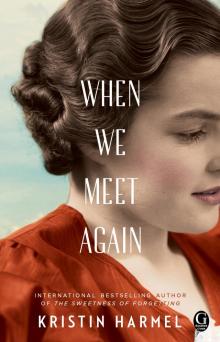- Home
- Kristin Harmel
When We Meet Again Page 5
When We Meet Again Read online
Page 5
“But you don’t think it was him?”
He shrugged. “Truthfully, I think Peter Dahler probably made a life for himself in Germany and never thought of Margaret again. I think that theirs was a wartime romance, something forbidden, and though the feelings might have seemed real to her at the time, it was never meant to last. And I also think we misjudged Peter Dahler, your grandmother and I. He may not have been a Nazi, but that didn’t make him a good man either. Perhaps the two of us saw merely what we wanted to see.”
I sat in silence for a moment. “She never spoke of him, you know. Not to me, and not to my father. We only knew that the man she’d loved had left her behind.”
“I always felt that keeping it a secret was a mistake.”
“You knew she didn’t tell us about him?”
He hesitated. “Yes.”
“So why are you telling me now?” I stopped abruptly and shook my head. “I’m sorry. I don’t mean to sound ungrateful. I’m so glad that you’re sharing this with me. But if she didn’t want us to know . . .”
He smiled. “In the end, she realized she’d been wrong, I think. I spoke with her about a month before she passed, and she told me that as she neared the end of her life—for of course she knew she was dying—she had come to terms with what had happened. She had forgiven him. And she had forgiven her family for disowning her. But she couldn’t forgive herself for keeping the truth from you and your father. ‘They have a right to know,’ she told me. ‘But I don’t know how to tell them. Not after all this time. I can’t bring myself to speak of him.’ I asked if I could help in any way, and she thought about it for a long time. Finally, she said, ‘Tell them if they ever come looking.’ And here you are.”
“Why didn’t she just write us a letter or something?” I asked. “Something we could open after she died, if she wanted us to know?”
“Because she wasn’t sure that telling you was the right thing,” he replied. “Do you understand? You had to seek the truth out on your own. I imagine she had a bit of a sense that you’d do just that one day. She was always telling me that you were a girl full of questions and that you always searched for the answers.”
I was silent for a moment as I imagined my grandmother in her final weeks, filled with regret but not knowing how to make things right. I swallowed hard. “How come I’ve never met you before?” I asked. “If you were so close to my grandmother?” I regretted immediately how rude the words sounded, but the journalist in me needed to know.
He looked surprised for a split second, but then he nodded, as if he’d expected the question. “We lost track of each other for a long time. When she left Belle Creek, I went with her, but only for a few years. Your father had just been born. I was only fourteen, and she was nineteen, almost twenty. She was scared and alone. We traveled separately until we got to the North—to Philadelphia—where I got a job at the Italian market on Ninth Street and she worked as a seamstress. I used to watch your daddy sometimes when she worked. I owed her everything. But then, just after your daddy turned four years old, I received a telegram saying that my father had lost his arm in a farming accident. I had to move home to care for him; there was no one else. I lost touch with Margaret after that because she didn’t want to be found, and she certainly wanted no connection to Belle Creek. She changed her name, totally reinvented herself.”
“She changed her name? Why?”
“I think she just wanted to be someone else,” he said. “Someone who didn’t come from a family that had turned their back on her, someone who hadn’t been rejected by the man she had believed so strongly in. She used to be Margaret Mae Evans, you know. But she was running from the past, and running is easier when no one can find you. It wasn’t until 1963 that I heard from her again. She was living in Atlanta then, and her son, your daddy, had just turned seventeen. She had just gotten back from the March on Washington, and like I said, she was sure she’d seen Peter there. She called me here in Belle Creek to ask if he’d come back looking for her. Of course he hadn’t. I hated to tell her that, because I knew how much it would hurt. But it was the truth. He never returned.”
“And after that? You stayed in touch?”
He shrugged. “Here and there, Christmas cards, the occasional call. I had children of my own by then, you understand, and my life was very busy. I owned my own farm, and we were struggling to stay afloat. And Margaret made me promise not to tell anyone that I knew where she was. She didn’t want to have anything to do with her sister.”
“She had a sister?”
“Yes. Louise. Her parents were dead by then, but I think that they’d been dead to Margaret long before that. After your father was born, they said they wouldn’t have the son of a Nazi living in their house, never mind a Nazi lover. Her sister was in complete agreement; she had totally turned on Margaret too. It hurt Margaret deeply, and she never forgot it.”
“What happened to all of them?”
“Her parents died in the late forties, and Louise inherited the family farm. I saw her many times over the years, but she never mentioned Margaret again. It was like she had never existed.” He paused. “Until last month. Louise died last month, and I got the strangest visit from her about a week before she passed. She said she was sorry for everything she’d done to her sister, and she wanted to know if Margaret was okay, if I still heard from her. I told her Margaret had died in February, and Louise seemed devastated. After a while, she gathered herself and asked, ‘Did the German come back before she died?’ I told her no, of course not. It was clear that Louise was still holding on to a grievance that was seventy years old. She just closed her eyes, murmured, ‘I’m so sorry,’ and walked away from my front door. She was dead a week later.” He looked up at me. “Her granddaughter still lives here in Belle Creek, you know. Maybe you should go see her.”
“For what?” I asked. “After all, it sounds like Louise went out of her way to make my grandmother’s life miserable.”
“But she was still your family,” he said. “Besides, maybe her granddaughter knows something I don’t.”
“Sounds like you were much closer to my grandmother than Louise ever was.”
“Yes, of course that’s true.” He paused. “But I’ve always wondered if there was more to the story of Peter Dahler than Margaret and I understood. It’s worth a try, isn’t it?”
I nodded slowly. Of course he was right; as a journalist, I always followed up on every available lead, and this time shouldn’t be any different. “Do you have contact information for the granddaughter?”
He nodded and jotted something down on a piece of paper. “Julie Candless. She’s a little younger than you. She lives over on Harper Road, on the other side of this cane field. It’s the same house your grandma grew up in, as a matter of fact. Might interest you to see it.”
I took the address and number from Jeremiah and then stood to shake his hand. “I can’t thank you enough for everything you’ve told me,” I said.
“I owe Margaret far more than this, believe me. But may I ask a favor of you?”
“Of course.”
“The painting you mentioned. The one that arrived with the note. May I see it sometime?”
I pulled out my phone. “I actually took a photo of it this morning. Will this do?” I scrolled through until I found the image. I handed it to him and watched as his eyes widened and then filled with tears.
“It’s her,” he whispered. “It’s exactly how she looked that day.”
“What day?”
He looked up at me. “The day she first met Peter in the fields.”
My heartbeat quickened. It was exactly what my father had said. “Is it possible that he painted this? Was Peter a painter?”
Jeremiah shook his head. “He wasn’t artistic at all, as far as I know. But he had a friend who was always sketching things in the dirt.” He smiled. “The man even used charcoal to draw on the sides of barns whenever the prisoners would be working on farmland. He was quite good.”
“What was the friend’s name? Do you remember?”
He was silent for a moment. “Maus, I think. Something Maus. I can’t recall his first name. I realize it’s not much to go on.”
“Still, maybe I’ll be able to find old POW records. Maybe I can find him.”
“May be a dead end, but it’s worth a try. If there’s anything I can do to help, anything else I can answer for you, feel free to call, Emily.”
I shook his hand again and he walked me to the door. “I really appreciate it, sir.”
He surprised me by pulling me into a hug. “I wouldn’t be here today without your grandmother. I owe her my life.”
He stood in the doorway, waving, until I’d pulled out of his driveway and was headed back across the vast expanse of sugarcane fields.
CHAPTER SIX
* * *
OCTOBER 1944
The soft thwacks of the cane knives flowed together in an endless rhythm, reminding Peter of rushing water. He was ankle-deep in muck, sweat pouring from his brow, his deeply tanned skin turning even browner in the beating sun. It was blazingly hot, the same temperature one might find on a sunny July day in Germany. But here, it was October, the month when at home, leaves fell, temperatures dropped, and the people of Munich were just finishing up their Oktoberfest celebration. Would there be an Oktoberfest this year? Peter doubted it. The festival hadn’t been held since 1938, and Peter wondered if it would ever happen again. Perhaps Germany would be defeated, wiped off the map, all its traditions erased. The thought made him sad. He didn’t believe in Hitler’s politics, but he believed in Germany. It was a beautiful country with a beautiful history, and to consider that it all might die because of greed and pride ripped Peter’s heart in two.
Peter liked to think about Germany while he worked. It kept his mind off the backbreaking labor, the blood of the men who’d been careless with their knives, the sunstroke that sometimes took one of them down in a dead faint. It kept him from thinking about the things he’d seen on the battlefield—blood, fear, terrible pain, the horror of young lives snuffed out in a senseless instant. And when he let his imagination wander, he could almost pretend that he was working alongside a babbling river—the Kirchseebach, perhaps—side by side with his friend Otto, close to his family, the Bavarian Alps looming in the background. But when a foreman’s voice or the rumbling arrival of an empty pallet truck jarred him back into the present, he was always dejected to find himself here, in the endless, rolling sugarcane fields on the edge of Florida’s Lake Okeechobee.
Every day, he and his fellow prisoners rose with the dawn, ate a hearty breakfast in the camp’s mess hall, and climbed aboard transport trucks that would take them ten kilometers up the road to the fields of Belle Creek. Their camp was on the edge of the wild Everglades, far outside of town, presumably so the residents would feel protected from the intruders at night. Peter knew that many of the people in the nearby towns viewed the prisoners as enemies, and he couldn’t blame them. But the locals who got to know them one on one—the foremen, the guards, the field hands, even the local doctor and priest—seemed to forget after a while that they were so different. And that was the truth of it, wasn’t it? Take a man’s weapons and put him to work, and he’s just a man, regardless of where he comes from. There were a handful of American Negroes working the fields too, and Peter always thought it odd when the foreman spoke to the foreigners with more respect than to his own countrymen.
“It’s your turn,” Maus said in German, nudging Peter’s shoulder and snapping him out of his reverie. Peter blinked at his new friend, whose nickname, German for mouse, had come from the amusingly white whiskers that sprouted above his top lip whenever he neglected to shave. They hadn’t known each other in Africa, though they had both served there, but they’d found themselves bunkmates here in the wilds of Florida, and they’d discovered they had much in common. They were both from the outskirts of Munich, and they were both skeptical about Germany’s chances of winning the war. While many of the other men in the prison camp were boisterous and sarcastic, Maus was, like Peter, quiet and pensive much of the time. At night, when the others played cards and told crude jokes, Maus liked to sketch on scraps of paper, and Peter liked to read books in English from the small camp library. They had become fast friends.
“Peter, are you listening?” Maus asked now, nudging him again.
“What?”
Maus laughed. “Daydreaming again, are you? It won’t get you home any faster.”
“I know,” Peter muttered. He wasn’t sure he even wanted to go home. Not while Germany was still in the midst of a war. Did that make him a coward? Or simply a realist who didn’t want to fight for a cause he didn’t support?
“It’s your turn,” Maus repeated, pointing to the ground and smiling. “I already got one this week.”
Peter followed Maus’s gaze to a curving, dark line at the base of a pile of freshly cut sugarcane stalks. A water moccasin, more than a meter long, lay still in the grassy underbrush. Peter could feel himself tensing.
“Relax!” Maus said with a laugh, noting Peter’s reaction. “He’s harmless.”
“Hardly,” Peter said. Water moccasins, he knew, were more benign than the deadly eastern diamondbacks, which were also spotted in the fields sometimes. But the venom of one of these shorter, blacker snakes could still render a man helpless. There were snakes in the fields constantly, one of the things that made Peter so uneasy. Although his fellow prisoners often made a game out of killing and skinning them, salt-curing and saving their hides as trophies on the barracks walls, Peter knew the reptiles were no laughing matter.
“Aren’t you going to kill it?” Maus asked.
“No,” Peter said. “I think that if we do not hurt him, he will not hurt us.”
The words were hardly out of his mouth when Dieter, a burly soldier who had served with Peter in Africa, slammed the heel of his work boot down on the head of the snake, killing it instantly. “Got it,” Dieter said, his voice flat and emotionless. “Next time, you have to be quicker, Dahler.”
Peter stared hard at Dieter, who smirked back. More than once, their arguments over politics had turned to fisticuffs, and Peter was tired of the man, who seemed to believe that they were always a hairsbreadth away from returning triumphant to Germany. Dieter didn’t like it much when Peter pointed out that the American newspapers suggested the war was turning in a different direction. In fact, Peter was confident that fighting would be over within the year, and that Germany would not be the victor.
“Just because you can read English, that doesn’t make you smart,” Dieter had snapped at him. “You’re too foolish to realize it’s all just propaganda. The führer will be victorious. You wait and see. You’re a traitor if you don’t believe it.”
As Dieter picked up the dead snake now, slinging it over his shoulders like a neckerchief, Peter turned away.
“You could have had it, you know,” Maus said quietly. “It was your turn.”
“I didn’t want a turn,” Peter replied. He breathed in deeply, though it was impossible to draw relief from the humid air. It was impossible to draw relief anywhere here.
He turned back to the crop and hefted his cane knife over his shoulder before the foreman or one of the guards accused him of whistling Dixie, a strange phrase he’d heard more than once. It meant wasting time, and although the slang sounded amusing, it came with unwelcome penalties—usually the most demanding assignment in the field the next day.
Maus began to sing quietly under his breath—Peter thought it was “Schön ist die Nacht”—as they sliced their way through the cane. Heft. Swing. Slice. Heft. Swing. Slice. Maus’s lips moved in time to the rhythm he was creating with his cane knife, and without really meaning to, Peter matched his tempo. He could see, in his mind’s eye, his mother sitting at the kitchen table, humming the familiar song along with their crackling radio while she peeled potatoes. He missed her voice, missed the way it felt when she touched his cheek
with those warm, worn hands, missed the way she used to comfort him. He was twenty-three; was that too old to miss one’s mother?
Sweat was pouring from Peter’s brow twenty minutes later as he paused to gather an armful of cane stalks. He took them to the first of four wagons hitched to an enormous, faded yellow tractor with tanklike continuous tracks over the wheels to keep the vehicle from sinking in the muck. The workers would labor each day to load the wagons, and then they’d accompany the tractor to the train tracks, where they’d hoist the cane, armload by armload, into train cars bound for the sugar mill.
“I’d give anything for a cool dip in the water right now,” Maus said as Peter returned to cutting. “Anything to escape this heat.”
Peter followed Maus’s eyes to the shallow ditch that bordered the field they were working in. The fields were separated by neat, even canals that weren’t more than a meter and a half across or a meter deep. They were there for the times when the workers had to burn the wilted leaves from the cane; it was always done the day that particular field was to be harvested. The cane itself didn’t burn, because the stalks were more than 70 percent water, so it was efficient to burn the dead brush first, leaving only a charred field of naked sugarcane behind. It was easier to fell the crop quickly after that without underbrush in the way. The canals were there to keep the fire from jumping to another field.
Unfortunately, the narrow waterways were also a ripe breeding ground for alligators, who lurked in the murky shallows. The huge, scaly beasts generally stayed out of the way, but Peter had heard stories of men who had tried to cool off in the water, only to find their limbs in the vise grip of enormous territorial lizards. “Do you want to get eaten, Maus?” Peter asked.
Maus shrugged. “Would it really be worse than having to work in this heat?”

 The Room on Rue Amélie
The Room on Rue Amélie The Winemaker's Wife
The Winemaker's Wife The Forest of Vanishing Stars
The Forest of Vanishing Stars The Book of Lost Names
The Book of Lost Names Italian for Beginners
Italian for Beginners After
After How to Save a Life
How to Save a Life The Blonde Theory
The Blonde Theory The Sweetness of Forgetting
The Sweetness of Forgetting When We Meet Again
When We Meet Again Life Intended (9781476754178)
Life Intended (9781476754178)